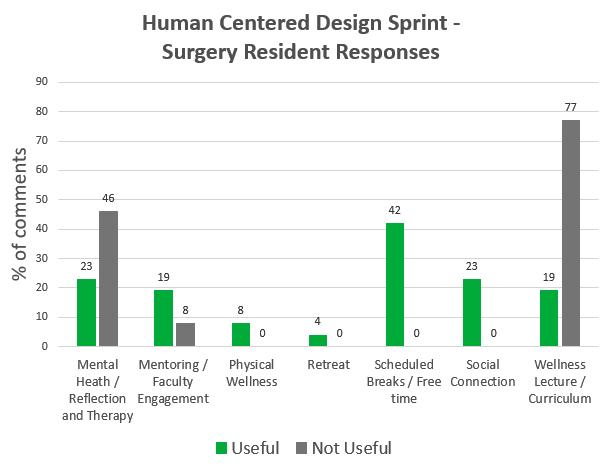
4 minute read
Surgery Resident Well-being: Critically Important, Difficult to Define, and Constantly Evolving Ethics and Patient Scenario: Ethical Allocation of
Bonnie E. Chow, MD, MA
General Surgery Resident
Christopher S. Davis, MD, MPH
Assistant Professor, Division of Trauma & Acute Care Surgery
COVID-19 completely changed our lives, for better or for worse, and the cumulative effects of the social isolation are yet to be seen. Prior to the pandemic, surgery residents already felt the strains of residency, including loss of control of their daily schedules, long hours, lack of autonomy, and intense workdays. Thus, this past year, our surgeons-in-training have had to remain incredibly resilient (or at least appear to be so). For some, however, underneath this strong cover is a silent struggle with impaired day-to-day functioning coupled with a fear of speaking-up. In fact, program-specific survey data following the 2019 American Board of Surgery In-Training Exam demonstrated that these items were already issues, as were negative outliers for duty hour violations, bullying experiences, and suicidal thoughts. As a consequence, we focused heavily on these and other negative outliers by refining a comprehensive surgery resident well-being program that ensures access to mental health resources 24/7, implements a more convenient method of work hour monitoring, and provides a host of initiatives designed to support the surgery residents to maintain a more positive culture.
For specific mental health resources, we partnered with Drs. David Cipriano and Jennifer Zaspel from the Department of Psychiatry to integrate well-being sessions into the resident curriculum, which also prioritized and advertised specific mental health clinics available to residents. For instance, each MCWAH resident is allowed three free and entirely anonymous mental health visits to the Resident Mental Health Clinic. An additional COVID-19 Coping Clinic was also started last year in anticipation of the significant aftermath of social isolation during the pandemic. Another resource through MCW and Froedtert Hospital is the Peer Supporter network, championed by Drs. Timothy Klatt and Alicia Pilarski. Trained Peer Supporters are available to any employee who would like to talk to someone regarding a clinical experience, whether it be a violent patient, bad outcome, or anything else that is affecting them. Most importantly is that the trained staff are colleagues such as nurses, techs, administrators, residents, and attending faculty that are available, and one can easily be connected with a same-level colleague in a different specialty. In total, there are three tiers of support in this system, with licensed psychologists and more formal mental health resources also being available. Notably, our residency program was randomized to the intervention arm of the SECOND trial,1 a randomized controlled trial based out of Northwestern University, studying well-being initiatives in surgery residency programs and their effects on resident morale and mental health. Although many of our interventions preceded the SECOND Trial Toolkit, we have been incredibly fortunate to enact many of the suggested interventions for our residents. These include coffee and non-perishable snacks available in the resident lounge 24/7, virtual (and eventually in-person) social events, flex-

ible vacation policies, free car rides home for significant fatigue after a call shift, a Resident Newsletter, and many more. More recently, we had a well-being Grand Rounds session on Ergonomics in the Operating Room, which focused on how to optimize body posture not only during surgeries, but also while sitting at a desk charting as well as other helpful exercises to mitigate muscle fatigue. Other Grand Rounds talks have created thoughtful discussions on diversity and inclusion, microaggressions, and cultural complications in surgery. One of the most well-received resident curriculum sessions is the “Faculty War Stories” intervention from the SECOND trial toolkit, where a panel of attending surgeons share difficult clinical experiences and their individual coping methods. This has since been broadened to a second panel on work-life balance, and we continue to revise and improve the armamentarium of the surgery residency well-being program.
As an additional means to ensure the well-being program’s effectiveness, the residents participated in a Human Centered Design (HCD) Sprint conducted by Dr. Alicia Pilarski, Dr. Christopher Davis, and Julia Schmitt of the Kern Institute, where actionable items were developed from resident responses and invaluable data were also gathered (Figure 1). Thirty-four surgery residents participated in this exercise, spanning all post-graduate years. Many of the suggestions from this HCD Sprint helped guide our recent initiatives, including a complete overhaul of the PGY25 Resident Curriculum to allow more protected education time and increased mentorship for residents through their burgeoning careers. Interestingly, dedicated wellness lectures during resident curriculum were billed ‘Not useful’ by many surgery residents, and we are actively working on revising these sessions to be more worthwhile. Intriguingly, residents across all participating specialties desired more social interaction, even in pre-COVID times, which truly underscores the inherent impact of the pandemic on the resident community through its requisite social isolation. Humans are fundamentally social beings, and as we emerge from the pandemic, residents will hopefully be able to have some semblance of a social lifestyle that will promote this culture of wellness.
FOR ADDITIONAL INFORMATION on this topic, visit www.mcw.edu/surgery or contact Dr. Christopher Davis at chdavis@mcw.edu.
REFERENCES 1. The SECOND Trial. http://www.thesecondtrial.org/.
Accessed May 23, 2021.
Mental Health Resources • MCWAH helpline: 414-955-4798 • Resident Mental Health Clinic: 414-9558933 or email cbischel@mcw.edu • Resident Crisis Line: weekdays 8a-5p: 414-314-5562; after hours: 414-805-6700 • National Suicide Prevention hotline: 800273-8255 or text ‘CONNECT’ to 741741 • MCW and FMLH Peer Supporter Network: 414-314-1763 (pager) • SOS (Supporting Our Staff) Peer Support Program through MCW Infoscope or
FMLH Intranet
To refer a patient or request a transfer/consultation, please use the references below:
ADULT PATIENTS
All Non-cancer Requests Referrals: 800-272-3666 Transfers/Consultations: 877-804-4700 www.mcw.edu/surgery Clinical Cancer Center Referrals: 866-680-0505 Transfers/Consultations: 877-804-4700

PEDIATRIC PATIENTS
Referrals/Transfers/ Consultations: 800-266-0366 Acute Care Surgery: 414-266-7858




